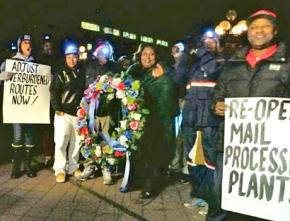Protesting delivery in the dark
Retired letter carrier explains why postal workers are mobilizing to protest being forced to make mail deliveries after dark.
SCORES OF postal workers and community allies marched on Martin Luther King Day at U.S. Postal Service (USPS) headquarters to dramatize the dangers of delivery after dark.
A recently released USPS report showed that deliveries after 5 p.m. had jumped from 20 percent in 2005 to over 40 percent last year. "We have carriers working over 12 hours [a day] every week," said Ken Lerch, president of the National Association of Letter Carriers (NALC) Branch 3825 in Rockville, Md. "More than half of the carriers in our branch are in the dark, carrying mail every night. It is much worse in Branch 142 out of D.C."
On November 23, 2013, city carrier assistant (CCA) Tyson Jerome Barnette was shot and killed while delivering mail in the dark in Prince George's County, Md. Letter carriers everywhere were outraged at the senseless, unnecessary death. To this day, carriers across the nation are still being forced to deliver late into the night.
Organizers of the march, the Communities and Postal Workers United, say this tragedy was set up by the dismantling of mail processing plants and the understaffing of sorting clerk positions, which has forced letter carriers to start later in the day. The killing was also set up by a flawed automation implementation, which has overburdened mail routes.

Carriers working after dark not only are subject to increased risk of random violence, but face unsafe and hazardous walking conditions due to unseen hazards. Customers can have dogs out or mistake carriers for prowlers, not expecting mail to be delivered late in the evening.
Seven members of Barnette's family made the 425-mile trip from South Carolina to Washington, D.C., to take part in the rally. "Make changes. Don't let another life be taken with something that can be fixed as easily as pushing the time back in the morning and getting [the letter carriers] started earlier," said the slain carrier's mother, Bridget Barnette.
Some 60 marchers, half of them letters carriers, many in uniform wearing head lamps or carrying flashlights, carried a funeral wreath from the Martin Luther King Memorial to USPS headquarters.
A postal representative, surrounded by police, accepted a large placard with a list of demands calling on postal management to end delivery in the dark, start letter carriers early in the day, fully staff sorting clerk and letter carrier positions, adjust overburdened mail routes, and re-open "consolidated" mail processing plants.
The African American community is particularly hard hit by the fortunes of the postal service, which has a 21 percent Black workforce. As well-paid career clerk, mail handler and city carrier jobs are being eliminated, low-paid temp jobs are being created. Barnette, a young Black man, who had worked for years as a "temp" with no benefits, had just suffered a 25 percent pay cut, and was being forced to work in the dark on an unfamiliar route.
"I firmly believe in the importance of preserving a strong U.S. Post Office, which has provided opportunities for our people to have decent, living wage jobs," said Rev. Cortly C.D. Witherspoon of Baltimore NAACP, one of the leaders of Monday's march. "Postal workers are part of the fabric of the Black community. When they suffer, we suffer. They are our sons and daughters, our parents, our neighbors. We must struggle to keep our postal workers safe."
District of Columbia Representative Eleanor Holmes Norton, a member of the U.S. Postal Service oversight committee, wrote to the Postmaster General: "I am deeply concerned about the apparent risk of requiring postal employees to deliver mail after dark."
The day after the MLK Day march, the USPS Office of the Inspector General announced it was opening an investigation into after-dark delivery in the D.C. area. D.C. area postal management also announced their intent to hire hundreds more CCAs.


